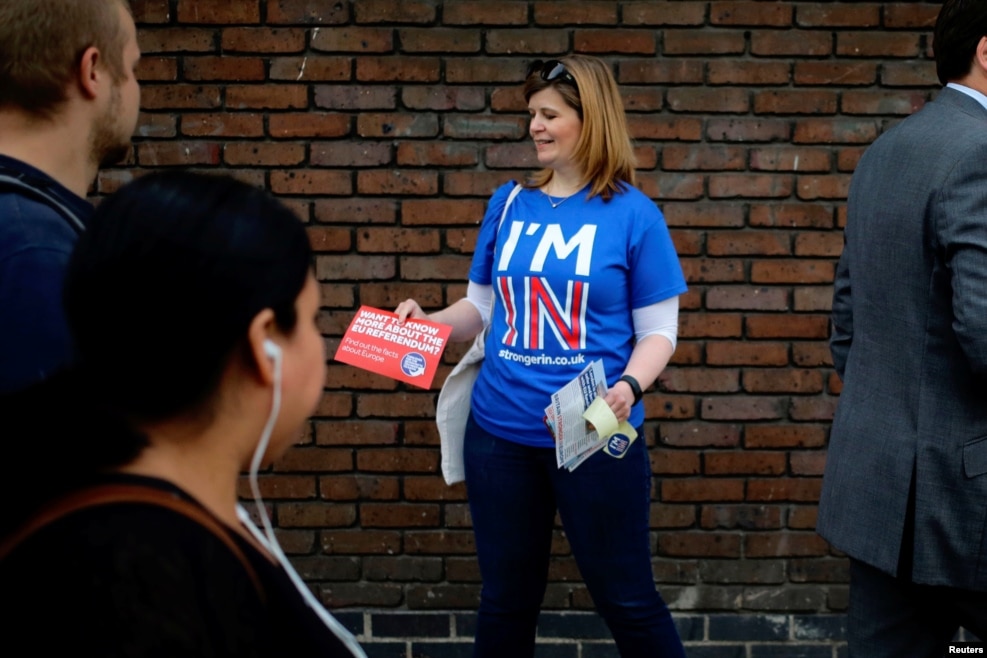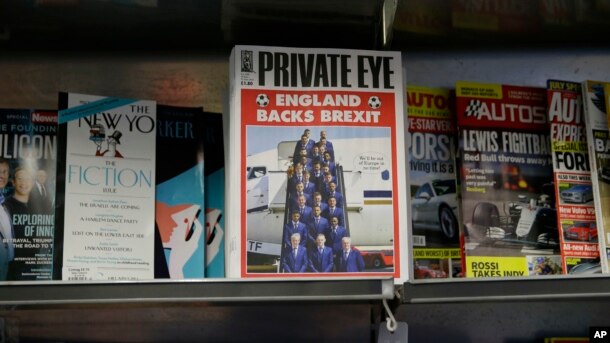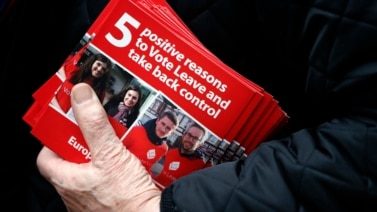
Britons are set to vote this month on whether to remain in the European Union.
Prime Minister David Cameron called for the vote, set for June 23. Cameron opposes calls for a “Brexit” -- for Britain to exit or withdraw from the 28-member EU. He says the move would hurt the country economically.
On Friday, German Finance Minister Wolfgang Schaeuble agreed with Cameron. He told Der Spiegel magazine that “it would be a miracle if a withdrawal of Britain would come without economic disadvantages.''
However, the vote has brought to light other countries' dissatisfaction with the European Union.
New research suggests public approval of the EU has fallen sharply across the continent.
This has raised concerns in Brussels, the home of the EU's headquarters. Officials there fear a contagion effect in which people in other EU member states demand similar votes.

The American-based Pew Research Center contacted 10,000 people across Europe to find out what they thought about being in the EU. Their answers showed that Britain is not alone in having deep concerns about the group.
Pew researchers say people in France looked at the EU more critically than their English-speaking neighbors to the north.
Only 38 percent of those asked had a positive or good opinion of the EU. That is sharply down from 69 percent in 2004.
In Spain, the public approval rate has fallen from 80 percent to 47 percent over the past nine years.
Tim Oliver is with the London School of Economics. He says a British decision to leave the EU could lead to demands for similar popular referendums across Europe. He adds, however, that nations will be watching Britain if it does choose to exit the EU.
“However, whether or not they succeed depends on one, what happens to the UK. If the UK struggles, then that sets quite a powerful message to the rest of the European Union.
Oliver thinks that a Brexit would take a long time and could create bitterness.
“The rest of the European Union is looking to either punish the United Kingdom for withdrawing, so there has to be an economic cost. The UK can't withdraw and not feel any punishment, any costs and so forth, and get a new relationship with the EU, or else that might encourage other member states to do the same thing.”
Pew researchers say much of the disapproval of the EU is related to how it has dealt with the current refugee crisis.
More than one million refugees and migrants arrived in Greece last year. Disapproval of the EU's policies on migrants is highest there, at 94 percent.
Oliver says the growing number of new arrivals has pushed the EU to its limits.
“They haven't solved each crisis, they've just managed to cope and move on, and hope they'll find a solution later on. If several crises align at the same time, that puts the EU in uncharted territory and that is quite dangerous.”
In Britain, current and former officials are making their case on EU membership to likely voters. Former British Foreign Secretary William Hague spoke to experts at Chatham House in London recently. He warned that a British exit could cause further divisions that would weaken Western nations -- something that ought to be avoided at all costs.
However, as disapproval of the EU grows, experts say a British exit could have much wider consequences both inside and outside Europe.
I'm Mario Ritter.
Henry Ridgwell reported this story for VOANews.com. Mario Ritter adapted it with additional material from VOA's Isabela Cocoli. George Grow was the editor.
We want to hear from you. Write your thoughts in the comment section below.
Words in This Story
disadvantages - n. something that causes difficulty
contagion - n. the spread of something that is passed from one person or group to another
bitterness - n. painful or unpleasant feelings
align - v. to put in place, to line up
consequences - n. results
referendum - n. a popular vote on legislation usually on one issue
exit - v. to leave
